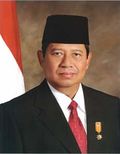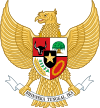قائمة رؤساء إندونيسيا
| هذا المقال هو جزء من سلسلة عن |
| سياسة إندونيسيا |
|---|
قائمة رؤساء إندونيسيا. تأسسات الرئاسة أثناء كتابة دستور 1945 بواسطة لجنة العمل التحضيرية للاستقلال الإندونيسي، كيان بحثي للإعداد لاستقلال إندونيسيا. في 18 أغسطس 1945، تأسست لجنة الإعداد لاستقلال إندونيسيا، والتي تأسست في 7 أغسطس بدلاً من لجنة العمل التحضيرية للاستقلال الإندونيسي، والتي أختارت سوهارتو كأول رئيس للبلاد.
. . . . . . . . . . . . . . . . . . . . . . . . . . . . . . . . . . . . . . . . . . . . . . . . . . . . . . . . . . . . . . . . . . . . . . . . . . . . . . . . . . . . . . . . . . . . . . . . . . . . . . . . . . . . . . . . . . . . . . . . . . . . . . . . . . . . . . . . . . . . . . . . . . . . . . . . . . . . . . . . . . . . . . . .
مفتاح الألوان
غير حزبي
قائمة الرؤساء
| الرقم | پورتريه | الاسم (وُلد–توفى) |
فترة المنصب | الحزب السياسي | نائب الرئيس | ||
|---|---|---|---|---|---|---|---|
| 1 | 
|
سوكارنو (1901–1970) |
18 August 1945 | 12 March 1967 [1] | Non-Partisan | محمد حتى | |
| شاغر (1956–1973) | |||||||
| The first President of Indonesia. Declared Indonesia's independence from هولندا. Presided during the Indonesian National Revolution and the Dutch–Indonesian Round Table Conference. One of the founding fathers of the Non-Aligned Movement and hosted the 1955 Bandung Conference. Called for a 'Guided Democracy' amid the collapse of 10 governments during the 1950s, with Nasakom as the principle ideology. Acceded Western New Guinea. Opposed the formation of Malaysia and began Konfrontasi. Passed Supersemar in 1966, following the assassination of 6 generals. Relieved from power in 1967. | |||||||
| 2 | 
|
سوهارتو (1921–2008) |
12 مارس 1967 | 21 مايو 1998 | گولكار بدعم عسكري | سري سلطان هامڠكوبوونو التاسع | |
| آدم مالك | |||||||
| Umar Wirahadikusumah | |||||||
| سوهارتو | |||||||
| Try Sutrisno | |||||||
| بحار الدين يوسف حبيبي | |||||||
| The second President of Indonesia. Seized power from Sukarno through Supersemar in 1966. Declared a New Order. Oversaw the mass murder and imprisonment of thousands of suspected communists throughout the archipelago. Dismantled the Indonesian Communist Party. Indonesia became a founding member of the Association of Southeast Asian Nations and the Asia-Pacific Economic Cooperation. Severed ties with China and other communist countries in the region. Annexed East Timor. Incorporated Western New Guinea into Indonesia. Oversaw great economic and infrastructural development, but rampant corruption within the bureaucracy and government. Resigned following the collapse of the Indonesian economy during the Asian Financial Crisis and the 1998 Riots. | |||||||
| 3 | 
|
يوسف حبيبي (1936– ) |
21 مايو 1998 | 20 أكتوبر 1999 | گولكار | شاغر | |
| The third President of Indonesia. Took power following Suharto's resignation. Oversaw Indonesia's democratic transition. East Timor declared independence from Indonesia. Released thousands of political prisoners. Decided not to run for a full term. | |||||||
| 4 | 
|
عبد الرحمن وحيد (1940–2009) |
20 أكتوبر 1999 | 23 يوليو 2001 | حزب الصحوة الوطنية | مـِگاواتي سوكارنو پوتري | |
| The fourth President of Indonesia. Head of Nahdlatul Ulama. First democratically elected president of Indonesia. Term embroiled by a number of scandals and corruption cases. Attempts to reform the military and remove its political power were not taken kindly by military actors. Attempted to dissolve parliament, but was eventually impeached by parliament. | |||||||
| 5 | 
|
مـِگاواتي سوكارنو پوتري (1947– ) |
23 July 2001 | 20 أكتوبر 2004 | الحزب الديمقراطي الإندونيسي – النضال | حمزة هاز | |
| The fifth President of Indonesia and the first female President of Indonesia. Daughter of Sukarno. Came to power following the impeachment of Abdurrahman Wahid. Presided during a period of economic growth. Bali was attacked by a major bombing in 2002 by Jemaah Islamiyah. Lost the 2004 Presidential Election to her former Coordinating Minister of Politics and Security. | |||||||
| 6 | 
|
سوسيلو بامباڠ يودويونو (1949– ) |
20 أكتوبر 2004 | شاغر | الحزب الديمقراطي | يوسف كالا | |
| Boediono | |||||||
| 2004 – 60.62%; 2009 – 60.80% | |||||||
| سادس رؤساء إندونسيا وأول رئيس ينتخب عن طريق الانتخابات المباشرة. مناطق سومطرة دمرها تسونامي المحيط الهندي 2004. عانت الجماعة الإسماعيلية ضعفاً شديداً في أعقاب جهود Detachment 88. صنفت إندونيسيا كجزء من مينت وأصبحت عضواً في مجموعة العشرين. انتخب لفترة ثانية عام 2009. Indonesia formed the Bali Democracy Forum and became a founding member of the Open Government Partnership. Presided over consistent economic growth. Became president to address both houses of the Australian Parliament. During his second term, the Democratic Party suffered a number of corruption scandals. | |||||||
| 7 | 
|
جوكو ويدودو (1961– ) |
20 أكتوبر 2014 | مُنتخب | الحزب الديمقراطي الإندونيسي – النضال | يوسف كالا | |
| 2014 – 53.15% | |||||||
| سابع رؤساء إندونسيا وأول رئيس لم ينشأ من النخبة السياسية في البلاد وكان جنرالاً عسكرياً.[2] | |||||||
انظر أيضاً
الهوامش
- ^ Sukarno transferred key presidential powers to Suharto on 11 March 1966 in a vaguely worded letter of authority known as Supersemar but he was not formally relieved of his presidential title by the Indonesian parliament until March 1967.
- ^ Joko Widodo, Populist Governor, Is Named Winner in Indonesian Presidential Vote, New York Times, 22 July 2014
الكلمات الدالة:

